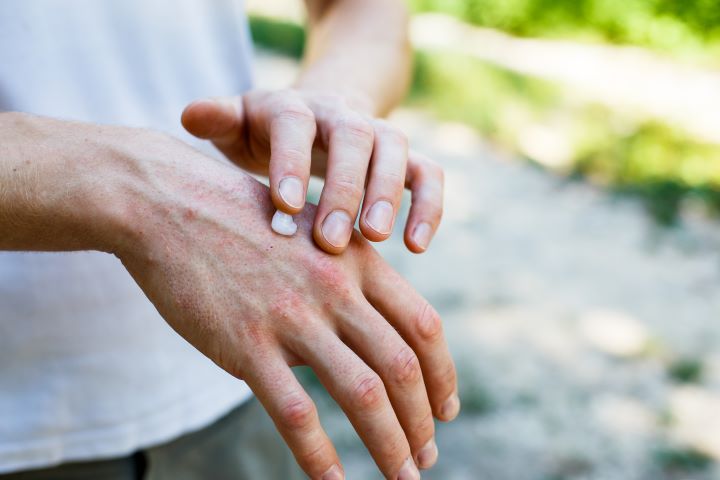Common Eczema Flare Triggers You Should Know About
Eczema is a medical condition that causes dry, itchy, and inflamed skin. It often develops in young children but can occur at any age. Atopic dermatitis is long-lasting (chronic) and sometimes flares up suddenly. It can be uncomfortable but is not contagious. Regular moisturizing and other skin care habits can relieve itching and prevent new outbreaks (flares). Treatment also includes the use of medicated ointments or creams.

Eczema, also known as atopic dermatitis, affects millions of people worldwide with its characteristic red, itchy, and inflamed patches of skin. While there’s no permanent cure, identifying what triggers your flare-ups is crucial for effective management. By recognizing and avoiding these triggers, you can significantly reduce the frequency and severity of eczema episodes and improve your skin’s overall health.
Environmental Triggers That Worsen Eczema
Environmental factors play a significant role in triggering eczema flares. Extreme temperatures—especially dry, cold winter air—can strip moisture from your skin, weakening its natural barrier function. Similarly, hot, humid conditions may increase sweating, which can irritate sensitive skin. Allergens like pollen, dust mites, pet dander, and mold spores commonly trigger reactions in people with eczema. Air pollutants, including cigarette smoke and industrial emissions, can also penetrate the skin barrier and cause inflammation.
Seasonal changes often bring shifts in humidity levels, temperature, and allergen concentrations that can affect eczema symptoms. Many people notice predictable patterns in their flare-ups corresponding with specific seasons. Creating an environment with controlled humidity (ideally between 45-55%) and temperature can help minimize these triggers, as can using air purifiers to reduce airborne irritants.
Irritating Fabrics and Skincare Products
What touches your skin directly can significantly impact eczema symptoms. Rough, scratchy fabrics like wool or synthetic materials often trigger flares through mechanical irritation. Instead, choose soft, breathable fabrics like 100% cotton, bamboo, or silk, which are less likely to aggravate sensitive skin. Laundry detergents containing fragrances, dyes, or harsh chemicals can leave residue on clothing that irritates eczema-prone skin.
Skincare products containing alcohol, fragrances, preservatives, or certain acids may compromise the skin barrier and trigger inflammation. When looking for the most appropriate moisturizer for severe eczema, focus on products specifically formulated for sensitive skin that contain ceramides, hyaluronic acid, or colloidal oatmeal. These ingredients help repair and maintain the skin barrier while providing intensive hydration. Patch testing new products on a small area before full application can help identify potential irritants before they cause widespread flares.
Stress and Its Impact on Eczema Flares
The connection between emotional stress and eczema is well-documented but often overlooked. During periods of high stress, the body releases stress hormones like cortisol that can trigger inflammation and immune system responses, potentially worsening eczema symptoms. Many patients report that their skin condition deteriorates during emotionally challenging times.
Implementing stress management techniques can be an effective way to reduce eczema flares. Regular exercise releases endorphins that counteract stress hormones, while practices like meditation, deep breathing, and yoga can activate the body’s relaxation response. Adequate sleep is also crucial, as sleep deprivation can increase inflammation and compromise immune function. For some individuals, working with a mental health professional to develop personalized stress management strategies may be beneficial as part of a comprehensive eczema treatment plan.
Food Triggers and Dietary Considerations
While not everyone with eczema has food sensitivities, certain foods can trigger flare-ups in susceptible individuals. Common culprits include dairy products, eggs, nuts, soy, gluten, and certain fruits. These food triggers often—but not always—correlate with foods that cause other allergic reactions.
Identifying food triggers typically involves an elimination diet under medical supervision, where suspected foods are removed from the diet and then gradually reintroduced while monitoring skin reactions. Some research suggests that anti-inflammatory diets rich in omega-3 fatty acids (found in fatty fish, flaxseeds, and walnuts) and antioxidants (abundant in colorful fruits and vegetables) may help reduce overall inflammation and improve eczema symptoms. Proper hydration is also essential for maintaining skin health, as dehydration can exacerbate dryness and itching.
Effective Treatments for Managing Eczema Flares
When considering how to make eczema go away fast during a flare-up, a multi-faceted approach typically works best. Topical corticosteroids remain the first-line treatment for reducing inflammation and itching during acute flares. For more severe cases, immunomodulators like tacrolimus or pimecrolimus may be prescribed to suppress the overactive immune response without the side effects associated with long-term steroid use.
The best way to get rid of eczema symptoms often involves consistent moisturizing—ideally multiple times daily and always within three minutes after bathing to lock in moisture. Wet wrap therapy, which involves applying medication and moisturizer before wrapping affected areas in damp bandages, can provide significant relief during severe flares by enhancing medication absorption and preventing scratching. For those with moderate to severe eczema that doesn’t respond to topical treatments, systemic options like oral corticosteroids, immunosuppressants, or newer biologic medications that target specific pathways in the immune system may be necessary.
Recommended Products for Eczema-Prone Skin
Finding the best skincare for eczema involves selecting products that support the skin barrier without causing irritation. Here’s a comparison of widely recommended options:
| Product Type | Recommended Options | Key Ingredients | Best For |
|---|---|---|---|
| Moisturizers | CeraVe Moisturizing Cream | Ceramides, Hyaluronic Acid | Severe Dryness |
| Vanicream Moisturizing Skin Cream | Petroleum, Glycerin | Sensitive Skin | |
| Eucerin Original Healing Cream | Urea, Glycerin | Cracked Skin | |
| Cleansers | Dove Sensitive Skin Beauty Bar | No Soap, 1/4 Moisturizing Cream | Daily Cleansing |
| La Roche-Posay Lipikar Wash AP+ | Shea Butter, Glycerin | Dry, Irritated Skin | |
| Cetaphil Gentle Skin Cleanser | Micellar Technology | Face & Body | |
| Specialty Products | Aveeno Eczema Therapy Cream | Colloidal Oatmeal | Itch Relief |
| Aquaphor Healing Ointment | Petrolatum, Panthenol | Barrier Protection | |
| Eucerin Eczema Relief Cream | Colloidal Oatmeal, Ceramide-3 | Flare Management |
Prices, rates, or cost estimates mentioned in this article are based on the latest available information but may change over time. Independent research is advised before making financial decisions.
Living with eczema requires a personalized approach to identifying triggers and finding effective management strategies. What works for one person may not work for another, so patience is essential when determining your specific triggers and optimal treatment plan. By systematically tracking potential triggers, working closely with healthcare providers, and maintaining a consistent skincare routine, most people can achieve significant control over their eczema symptoms. Remember that eczema management is typically ongoing, and adjustments to your approach may be necessary as seasons change, life circumstances evolve, or your skin’s needs shift over time.
This article is for informational purposes only and should not be considered medical advice. Please consult a qualified healthcare professional for personalized guidance and treatment.




